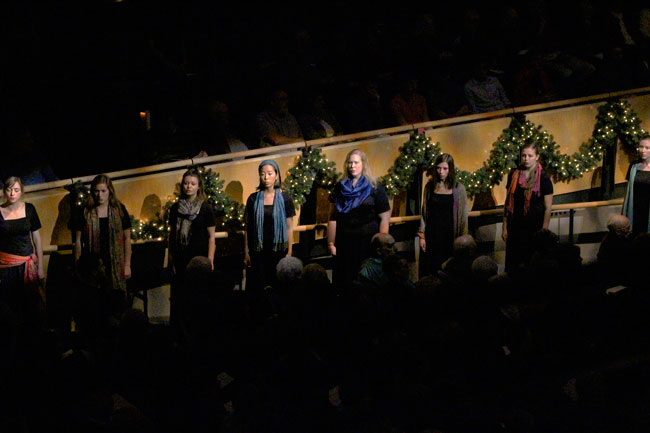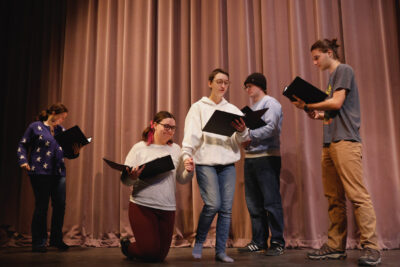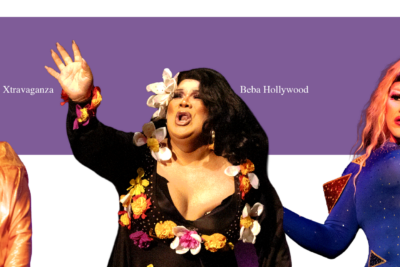Debra Detwiler Brubaker, director of Goshen College’s Women’s World Music Choir, believes that women have a special capacity for instigating change.
“We know what’s right,” said Detwiler Brubaker. “We will come up against the power that is causing this wrong to happen, and we will do what is right. That’s the way to disrupt something. And I just think women inherently know that.”Women’s role in creating, sustaining and disrupting culture was the main focus during the Women’s World Music Choir’s performance on Tuesday afternoon at the Afternoon Sabbatical presentation in Sauder Concert Hall. Detwiler Brubaker led the choir in a program of songs and stories that highlighted the power of women in community.
The Afternoon Sabbatical program is a yearly lecture series organized by Jeanette Yoder, which gives Goshen professors and ensembles a chance to share their studies with the community during a monthly presentation on Tuesday afternoons at 1 p.m.
Despite including the word “sabbatical” in the title of the series, programs do not have any correlation with professors who have recently taken sabbaticals (as is the case with Detwiler Brubaker, who took a sabbatical in the fall of 2015). Detwiler Brubaker says that the word “sabbatical” focuses more on the people who come, as the program serves as a sabbatical from their week.
This year’s theme in the women’s choir was taken from their mission statement. During the program on Tuesday, Detwiler Brubaker explained that the statement originally only included creating and sustaining. However, Detwiler Brubaker went on to explain how Zulma Prieto, founding editor of “El Puente” (the first Spanish-language newspaper in Indiana), challenged these themes by themselves and discussed the importance of including the power of disruption.
In an interview after the program, Detwiler Brubaker stated that Prieto “came out against that idea of creating and sustaining.” Detwiler Brubaker thought Prieto may have “interpreted [her] statement as putting women in a box of ‘They’re these beautiful creators and sustainers.’”
Detwiler Brubaker notes that Prieto’s addition of women being a disruptor more fully encompassed the depth and strength of women. Detwiler Brubaker states that Prieto’s “comment about women being disruptors is just so wonderful and empowering–that that’s one of the things we do, too!”
The performance began with a rendition of Sweet Honey in the Rock’s piece “The Women Gather.” The song says that in the face of grief, women will gather crying no matter where they’re living. After that, the women’s choir performed a First Nations gathering song.
Dona Park, a senior, then shared a story about her mother, followed by the Ulali Mother Tribute, a First Nations song that praises the strength of mothers who are the water carriers and drummers of life. In her introductory comments, Detwiler Brubaker stated that women have the ability to look and not turn away. To represent this concept, the choir stood in two concentric circles during these pieces, looking at each other and exchanging encouragement and energy.
The choir then sang a set of two African songs, one of which was “Hosanna,” a South African song that says that if no one else will sing, the rocks will rise up and sing. This song was followed by a story interlude by Sarah Hartman-Keiser, a junior, who spoke about the strength of women on her SST service location in Cambodia. The choir continued to sing a Shona piece from Zimbabwe, called “Munotuma Aniko,” that both asks and answers a question: “Who will go? I will go!”
The Women’s World Music Choir ended the program with a lively Bulgarian song and dance entitled “Teften Kate,” complete with a string and wind ensemble and a line dance. The song roughly translated to “Whose dance is the best dance? The girl’s dance!”
Detwiler Brubaker tried to make sure the program reflected not only her experiences but those of the choir members as well.
“Storytelling is so powerful, and that’s one reason why I thought about having the women tell stories,” she said. “To be able to connect what we were doing with the First Nations songs with our experience on tour and then just mentioning my experience on the March on Washington and my conversation with Zulma–I thought those were both really important.”
The Women’s World Music Choir can be seen in their last performance of the year at the Earthtones concert on April 22 at 7:30 pm in Sauder Concert Hall.


